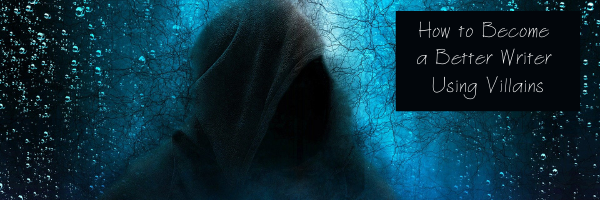How to Become a Better Writer Using Villains

I often receive letters and messages from fans asking for writing advice, and I do my best to point them toward the many resources for writers on my website. But as we move closer to Halloween, I thought I’d offer those seeking advice on becoming a better writer a new tip: get into the spirit of the spooky season and consider some of the ways villains can improve your writing!
How Villains Help You Write Better Characters
Villains require you to dig deep into your character’s past and motivations
By giving complex motivation to your villains, as well as your heroes, you can give a greater sense of realism to your characters. A multi-faceted villain is a more compelling villain. I would even go as far as to say you ought to give just as much thought into the personality of your antagonist as you do to your main character!
For me, getting to know my characters — heroes and villains alike — as thoroughly as I would a real person is key. I usually make extensive notes about each character before I start to write then expand that description as I get to know them better with every draft. When you see how they look in your mind, and can hear their voices echoing, then you’ve begun to know who they really are. But it’s not until they lean close and whisper to you their innermost secrets — their deepest fears, their highest hopes, and their innermost longings — that they are truly real. Then I rewrite, rewrite, and rewrite — researching whatever is required to make my story feel true. Remember: the better you understand who your villain really is, the more real they will be for the reader, and the more vivid the hero’s stakes become.
Villains allow you to explore contrasts within your writing.
A funny thing about our world is that where the light shines brightest, the shadows are often the darkest. And just as shadows begin where the light ends, exploring how different a hero is from her nemesis can be a great way of highlighting a character’s darker elements. For example, Merlin’s encounter with Stangmar in Book 1 of the Merlin Saga reveals the king to be a terrifying, ruthless, corrupted old man, filled with anger and greed — which makes him all the more a villain when contrasted with the kindness and innocence of the young hero.
Another excellent way to highlight the darker parts of a character is to explore their internal contrasts. Perhaps your villain claims to have a good purpose, but his actions reveal an ulterior motive; or maybe your character’s pure and virtuous backstory contrasts sharply with her current life of villainy. An antagonist who inflicts terrible pain on the hero but who also spends their free time volunteering to help injured animals is a much more interesting character than someone who is simply evil through and through.
Villains help unleash your creativity.
I find that, even beyond what they contribute to a story, villains can be lots of fun to write about! When you fully explore the inner lives of the characters you create, there can be a real sense of freedom when developing a character to whom the normal rules of society simply don’t apply. The best villains are the ones we love to hate, and developing their malevolent characteristics can really stretch the limits of a writer’s imagination. And just as writing allows you to enjoy places you may never visit or eras you don’t live in, you might just find yourself basking in the freedom to dream up new, deliciously wicked plans for your antagonist.
Part of the magic of writing is that it gives us nearly unlimited freedom to focus on the stories we love, featuring the very best shadowy souls, heroic figures, or otherworldly settings we can dream up. Despite that freedom, however, the trick to improving as a writer is not so different than learning any other skill: no matter how much raw talent someone begins with, becoming better at anything takes practice, discipline, and persistence. Through my years of writing, I have found that it is the hardest — as well as the most joyous — work I’ve ever done… and it’s that joy that makes all the hard labor worthwhile. So no matter what you choose to write about — villains or heroes, fiction or non-fiction — I encourage all you aspiring authors to stay with your writing, no matter how many rewrites it takes to get it right!

